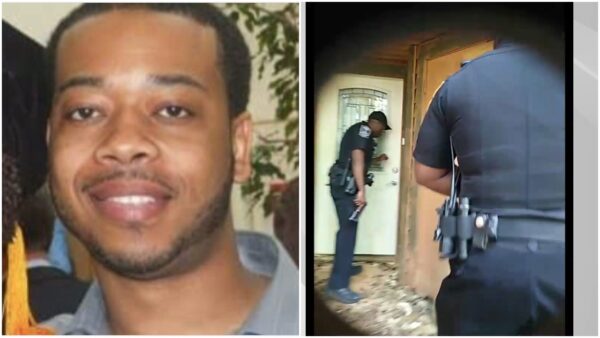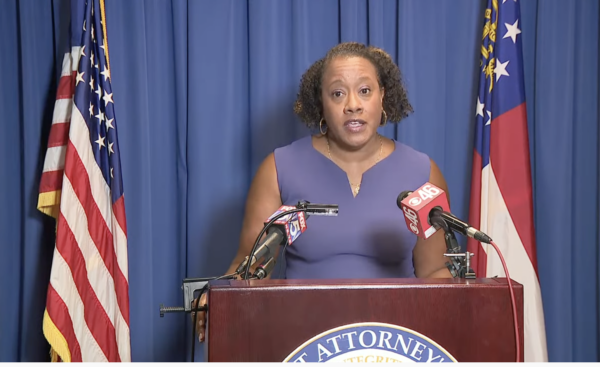The family of Matthew Zadok Williams, a man killed by Georgia police, is considering legal action after the district attorney failed to pursue criminal charges against the officers involved in his fatal shooting last year in suburban Atlanta.
DeKalb County District Attorney Sherry Boston said the officer who shot Williams through a doorway at his Decatur home was “justified” in his use of deadly force and has “no criminal culpability.” But Williams’ family and their lawyer said Boston disregarded the man’s mental state and the numerous policies the officers ignored that could have yielded a better outcome.

Family attorney Mawuli Davis said his office is preparing to file a lawsuit against the county and the officers involved in the shooting.
“I think [Boston] and her team got it wrong, quite frankly,” Davis told Atlanta Black Star.
“We think the law that she relied upon, her team relied upon was just not consistent with the facts of this case and the circumstances of this case,” he added.
Williams was shot three times through his front door by DeKalb County Sgt. Devon Perry from his porch as he shielded his body with an ottoman on the other side of the door. Boston said the officers had the green light to use deadly force because Williams was armed with a knife and had waved it at an officer before.
Boston announced her charging decision in the case 16 months after the April 12, 2021, shooting. The district attorney said she reviewed the Georgia Bureau of Investigation’s findings in the case before making her determination. Boston said she concluded, “after an exhaustive review of the facts, circumstances, relevant law, policies and training protocols associated with this matter.”
“These cases are not easy, and every loss of life is a tragedy,” Boston said. “However, not every loss of life is a crime.”
Zadok’s sisters Hannah and Zephorah Williams said Boston did not consider mental health in her decision. However, they said Zadok appeared to be having a mental episode in the body-worn camera footage of the incident, and he had a history of behavioral problems.
One of the officers on the scene of the April 12 shooting had responded to a behavioral health call less than a month prior. Zadok’s family said he called 911 and requested an ambulance. Dispatchers sent Officers Mikhail Morgan and Kameron A. Brooks to his home.
Morgan also responded to the April 911 call from Zadok’s neighbor, who accused him of being a homeless trespasser brandishing a knife. Morgan, at one point, tells the other officers about the previous encounter and acknowledges that Zadok has mental problems. The March incident report indicates that Zadok told dispatchers that he was being “stalked by 911” and hung up the phone.
Zadok’s family and Davis said the officers ignored the police department’s policy on approaching people who may have mental health issues. The policy calls for officers to remain calm and avoid overreacting or agitating the situation. It also advises officers to “understand that a rational discussion may not take place,” which the family said was crucial.
The family said Boston left Zadok’s mental condition out of the findings she presented to them before making the final announcement.

“She’s acting as if his actions were that of someone who exhibited intentional behavior without acknowledging that he was somebody in a medical crisis and didn’t know what he was doing and was perceiving things differently,” Hannah told Atlanta Black Star.
Zadok’s sisters and attorney said the presentation was a “clear indication” that mental health was not factored into Boston’s decision. The district attorney, however, told WABE that the man’s mental health did not limit the officer’s authority to use deadly force.
“When someone is armed with a weapon, whether it’s because they are in a mental health crisis, or they just choose to pick up a weapon for the sole purpose of inflicting harm,” Boston said. “Keep in mind that both of those situations are equally dangerous and present the same harm for a law enforcement officer or the public, so there’s no distinction as to why you might have that weapon in your hand.”
“The question is, if you have the weapon in hand, does it present a danger.”
Davis and Zadok’s family said Zadok was not a threat to officers as he hid behind the ottoman in his home. Still, Boston pointed out that he lunged at an officer with the knife before he retreated into the house, which is an attempted assault on an officer. She also said that Perry shot the fatal shots as Zadok motioned forward to close the door, but Davis said the moment was no different than the other times Zadok closed the door during the standoff with officers.
The officers pleaded with Zadok to drop the knife and come out of the house, and he told them that he was defending his property, body-worn camera video shows.
Zadok’s family said the officers also ignored the department’s policy on rendering aid, activating SWAT officers, and using force.
Zadok bled out for 90 minutes while officers waited for SWAT to arrive. Video footage of the incident shows that a superior told Perry he should aid the man before he bleeds out, but the officer did not, even after an EMT offers to help.
The officers called SWAT after the shooting, but the agency’s policy calls for SWAT to be activated for “barricaded individuals,” the family also contends. They cited a similar incident in the county where a white man barricaded himself in his home while holding his wife hostage, and officers resolved the issue without violence.
Zadok’s sisters said when they mentioned the policy on barricades to Boston during their meeting, the district attorney disputed their claims that their brother had created a barricade. But she later said he was barricaded in the house when she announced her charging decision.
According to the International Association of Chiefs of Police, a “barricaded individual is a person who has taken a position in a physical location, most often a structure or vehicle, that does not allow immediate police access—and who is refusing police orders to exit.”
Zadok’s mother, Chris Ann Lewis, said the district attorney’s decision not to file charges is “ridiculous.”
The officers involved in the shooting are still on the job and have not faced any penalties as a result of the outcome. However, Lewis, a retired nurse, said if a nurse does something negligently, they can be charged criminally, and the same should apply to the officers.
Boston said in her role as district attorney, she does not decide whether the police officers could have done something different but if what they did was criminal. She said it is up to the police chief and other police officials to examine misconduct.
The family is adamant that they will keep fighting against the injustices they’ve found. Lewis said the county and law enforcement agencies should outsource similar investigations to independent agencies or parties to ensure unbiased decisions.
“These DAs have too close of a relationship with these police departments, and it’s really unfair to them that they are given these cases in the first place,” she told Atlanta Black Star.
“It will definitely give the people, the citizens, more confidence when these decisions are made,” she added.


